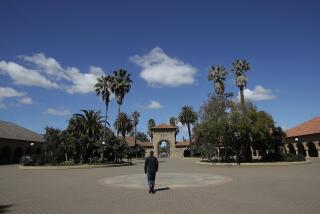Higher Fees at State Colleges
Gov. Pete Wilson’s outrageous justification of higher fees for college students at our two state university systems (“Wilson See Cutbacks as Permanent,” Sept. 6) demands a response.
First, his argument is Orwellian Newspeak on the order of black is white: It is not that “low- and moderate-income working families (will) pay higher tax subsidies for the education of kids who can afford it,” rather that the increased fees will exclude more of the children of those low- and moderate-income families from higher education. Those who can least afford it will now more than ever be subsidizing the education of those who can.
Finally, and surprisingly, Wilson himself suggests a solution. When he remarks that “It is not fair for a truck driver, with a family of four, to have to pay more (taxes) to subsidize the education of the CSU or UC students whose family may be making double the salary of the truck driver,” he is implicitly endorsing the principle of “from each according to his abilities.” By this principle, not only should the poorer pay less, but the richer should pay more. Why then should not higher-income students pay more in fees for a state-subsidized education, rather than saddling low- and middle-income students with the burdens and stigma of seeking special aid?
Wilson has worked hard to augment the increasing and unprecedented gap between the richest and poorest in our state, and is now trying to justify reserving the upper tiers of public education for the--needless to say, mostly white--richest. Progress in this most culturally diverse state, from the standpoint of business as well as from the standpoint of individual citizens, cannot mean using public education to create a more divided and ill-educated citizenry. California has prided itself on its superior system of accessible higher education, and for its survival, the state must return this goal to among its highest priorities.
NANCY M. HENLEY, for Concerned Faculty at UCLA
More to Read
Sign up for Essential California
The most important California stories and recommendations in your inbox every morning.
You may occasionally receive promotional content from the Los Angeles Times.









